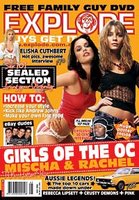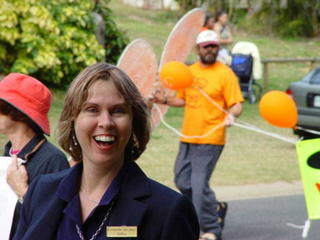The partially-sighted leading the blind - my first how to blog session for library members
Well, it's Library and Information Week and my professional colleagues and I (now officially numbering 3 altogether - for the first time meeting State Library of Qld's guidelines for ratio of qualified librarians to population!!) are ambitiously offering a series of workshops on:Blogging (that's mine); how to use the Web OPAC; and how to access the State Library's free databases (Newsbank, ANZ Ref Centre etc.) I kicked off with a guest lecture to about 50 people at the u3A last Friday on "Blogs, Pods and Wikis" which went over very well, and tonight 3 people from that group came along to join 2 others from the general library membership to "Learn How to Blog" in one hour! (Not a bad turnout for "State of Origin*" night).
The hour went like this:
1. Quick explanation of what blogs are, blog statistics etc. (very quick).
2. Here's one I prepared earlier - let's look at the library bookgroupblog and see what a blog looks like, check out general layout and features and leave a comment (navigate the word verification thingie).
3. Now let's find Blogger via Google. Let's randomly click on some of the blogs that scroll through the blogger homepage and practice a little voyeurism. Leave a comment if you're game.
4. Now let's proceed straight to creating your own blog. (General help with navigating the 3 steps)
5. Voila everyone has own blog, and feeling they have really achieved something. Now keen to find out heaps more about blogs. Luckily hour is over, as "teacher's" knowledge of blogs just about exhausted.
Comments were along the lines of "I knew nothing about blogs now I have a clue"; "Do you expect me to sleep after this?" and "Gee you packed alot into one hour".
Sometimes you can get away with being only a page ahead of the "students" to offer something of value...
Thanks to commenters to previous post - will follow up your leads with thanks.
*For the benefit of non-Queensland/New South Wales readers, the most anticipated and watched rugby league football match of the season - much bigger than the NRL grand finals.
The hour went like this:
1. Quick explanation of what blogs are, blog statistics etc. (very quick).
2. Here's one I prepared earlier - let's look at the library bookgroupblog and see what a blog looks like, check out general layout and features and leave a comment (navigate the word verification thingie).
3. Now let's find Blogger via Google. Let's randomly click on some of the blogs that scroll through the blogger homepage and practice a little voyeurism. Leave a comment if you're game.
4. Now let's proceed straight to creating your own blog. (General help with navigating the 3 steps)
5. Voila everyone has own blog, and feeling they have really achieved something. Now keen to find out heaps more about blogs. Luckily hour is over, as "teacher's" knowledge of blogs just about exhausted.
Comments were along the lines of "I knew nothing about blogs now I have a clue"; "Do you expect me to sleep after this?" and "Gee you packed alot into one hour".
Sometimes you can get away with being only a page ahead of the "students" to offer something of value...
Thanks to commenters to previous post - will follow up your leads with thanks.
*For the benefit of non-Queensland/New South Wales readers, the most anticipated and watched rugby league football match of the season - much bigger than the NRL grand finals.




